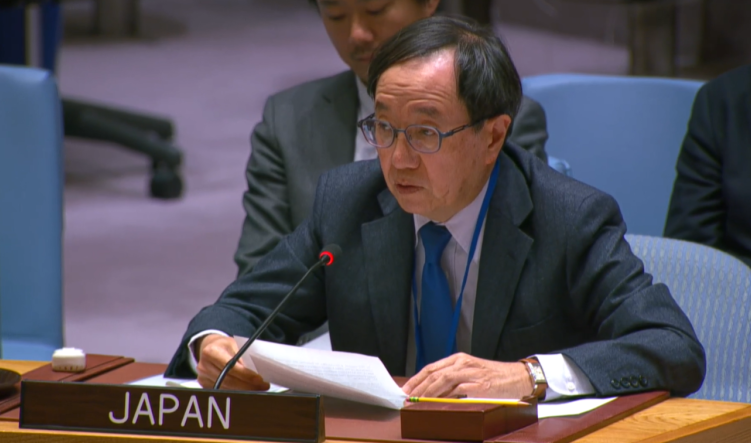Statement by H.E. Ambassador YAMAZAKI Kazuyuki, Permanent Representative of Japan to the United Nations, at the United Nations Security Council Briefing on “Strengthening Maritime Security through International Cooperation for Global Stability”
2025/5/20

(As delivered)
Thank you, Mr. President. I wish to express Japan’s gratitude to Greece for taking the initiative to hold this timely meeting on such a critical topic. I also thank the briefers for their meaningful briefings.
As a maritime nation, Japan views the safety and security of the seas as vital for both itself and the whole of the international community.
We all benefit from oceans as they connect us for commerce and transportation, provide us with natural resources, and play an essential role in the conservation of biodiversity. Therefore, thorough respect for the rule of law at sea is in our common interest.
In this regard, I would like to reiterate the universal and unified character of the 1982 UNCLOS and reaffirm its irreplaceable role in setting out the legal framework that governs all activities in the oceans and seas.
Mr. President,
I wish to draw the Council’s attention to Indo-Pacific Ocean, which comprises one third of the entire ocean on the earth. In 2016, Japan proposed a vision of a “Free and Open Indo-Pacific,” consisting of three pillars: 1) promotion and establishment of the rule of law, freedom of navigation, and free trade; 2) pursuit of economic prosperity through improving connectivity; and 3) commitment to peace and stability through capacity building.
Looking at the reality in the Indo-Pacific region, unilateral attempts to change the status quo by force or coercion have been continuing and strengthened in the East China Sea and the South China Sea, and we once again reiterate our strong opposition to such attempts. We express our appreciation to those who have shown a commitment to the peaceful settlement of disputes in the South China Sea in accordance with international law.
Against this backdrop, I call for all Member States to stand firm and speak out on upholding the rule of law at sea, maintaining freedom of navigation and overflight, and resolving conflicts peacefully, in accordance with international law, as reflected in UNCLOS.
Mr. President,
Maritime peace and security can be achieved through collective and inclusive efforts by Member States.
In particular, there is growing need to enhance maritime domain awareness to respond to emerging threats in the ocean, such as illegal, unreported and unregulated fishing, piracy, drug trafficking, trafficking in persons, smuggling of migrants, ship to ship transfer, natural disasters, submarine cable disruptions, and marine pollution. These threats can be effectively addressed through joint efforts by relevant countries, as all oceans are connected and inseparable. This is why Japan is committed to enhancing capacity building of those countries in need.
In closing, Japan will continue to cooperate with the international community to maintain and reinforce the free and open international order based on the rule of law so that the nations and peoples of the world can live in peace, stability, and prosperity. Japan is determined to lead the global efforts to this end.
I thank you, Mr. President.
As a maritime nation, Japan views the safety and security of the seas as vital for both itself and the whole of the international community.
We all benefit from oceans as they connect us for commerce and transportation, provide us with natural resources, and play an essential role in the conservation of biodiversity. Therefore, thorough respect for the rule of law at sea is in our common interest.
In this regard, I would like to reiterate the universal and unified character of the 1982 UNCLOS and reaffirm its irreplaceable role in setting out the legal framework that governs all activities in the oceans and seas.
Mr. President,
I wish to draw the Council’s attention to Indo-Pacific Ocean, which comprises one third of the entire ocean on the earth. In 2016, Japan proposed a vision of a “Free and Open Indo-Pacific,” consisting of three pillars: 1) promotion and establishment of the rule of law, freedom of navigation, and free trade; 2) pursuit of economic prosperity through improving connectivity; and 3) commitment to peace and stability through capacity building.
Looking at the reality in the Indo-Pacific region, unilateral attempts to change the status quo by force or coercion have been continuing and strengthened in the East China Sea and the South China Sea, and we once again reiterate our strong opposition to such attempts. We express our appreciation to those who have shown a commitment to the peaceful settlement of disputes in the South China Sea in accordance with international law.
Against this backdrop, I call for all Member States to stand firm and speak out on upholding the rule of law at sea, maintaining freedom of navigation and overflight, and resolving conflicts peacefully, in accordance with international law, as reflected in UNCLOS.
Mr. President,
Maritime peace and security can be achieved through collective and inclusive efforts by Member States.
In particular, there is growing need to enhance maritime domain awareness to respond to emerging threats in the ocean, such as illegal, unreported and unregulated fishing, piracy, drug trafficking, trafficking in persons, smuggling of migrants, ship to ship transfer, natural disasters, submarine cable disruptions, and marine pollution. These threats can be effectively addressed through joint efforts by relevant countries, as all oceans are connected and inseparable. This is why Japan is committed to enhancing capacity building of those countries in need.
In closing, Japan will continue to cooperate with the international community to maintain and reinforce the free and open international order based on the rule of law so that the nations and peoples of the world can live in peace, stability, and prosperity. Japan is determined to lead the global efforts to this end.
I thank you, Mr. President.
